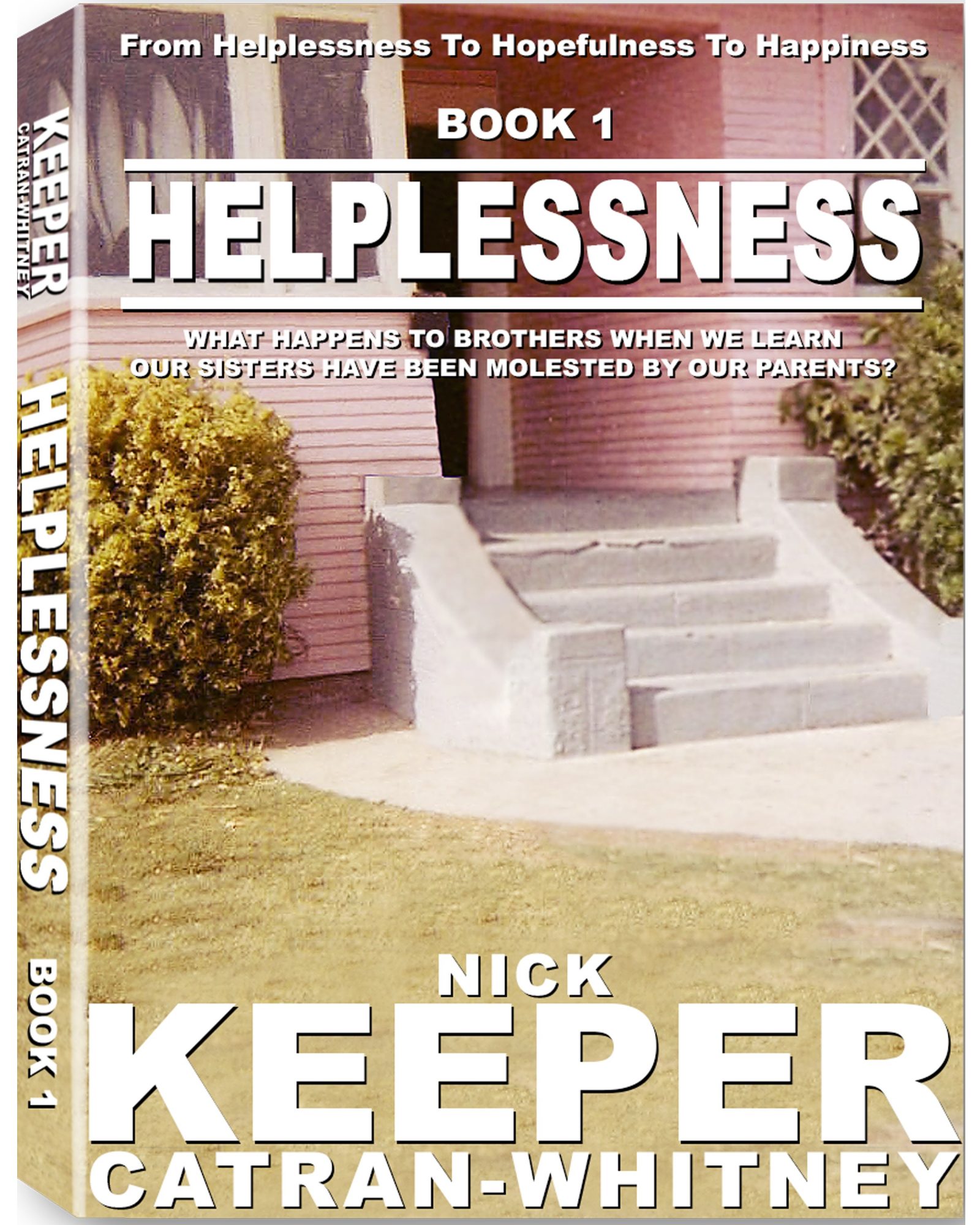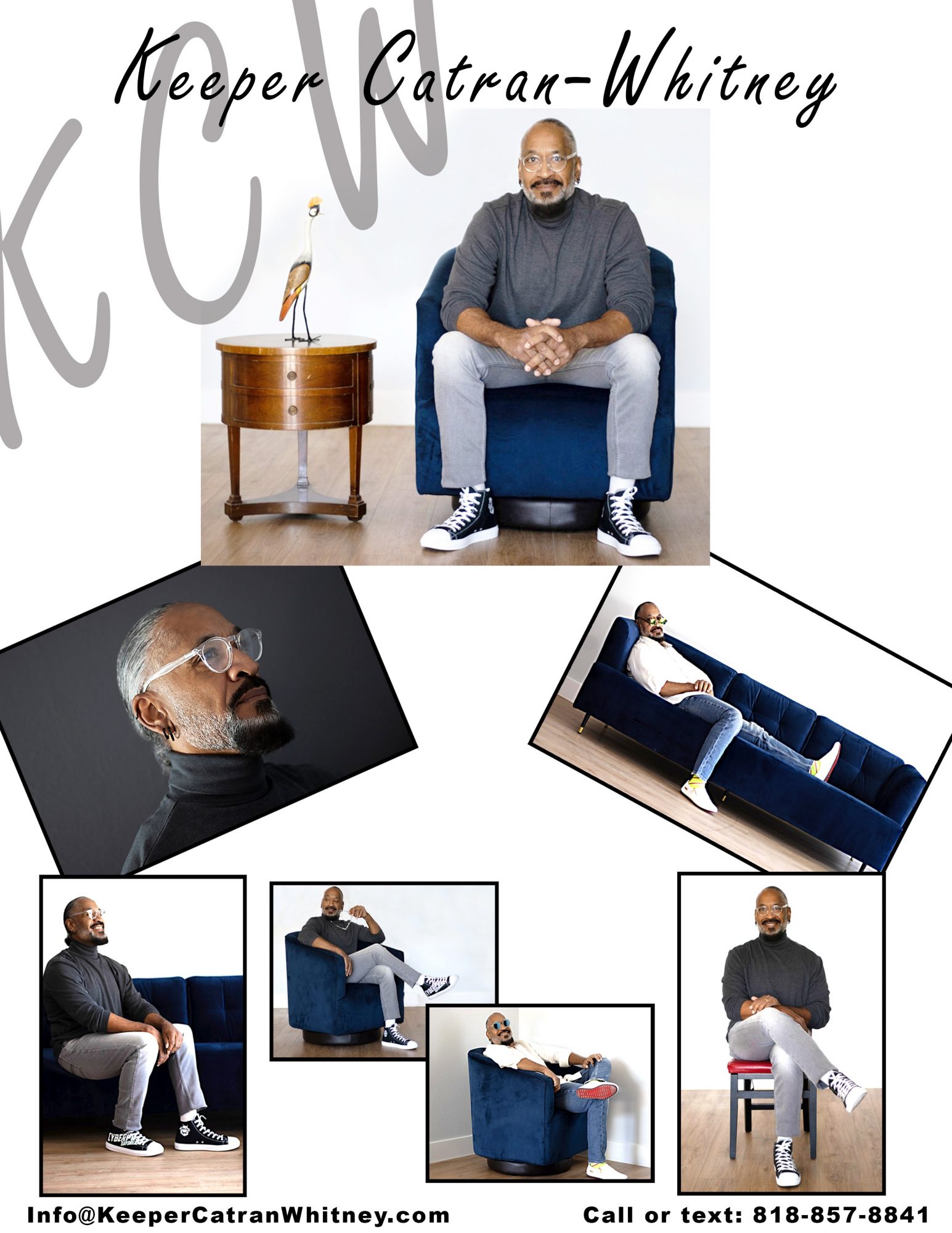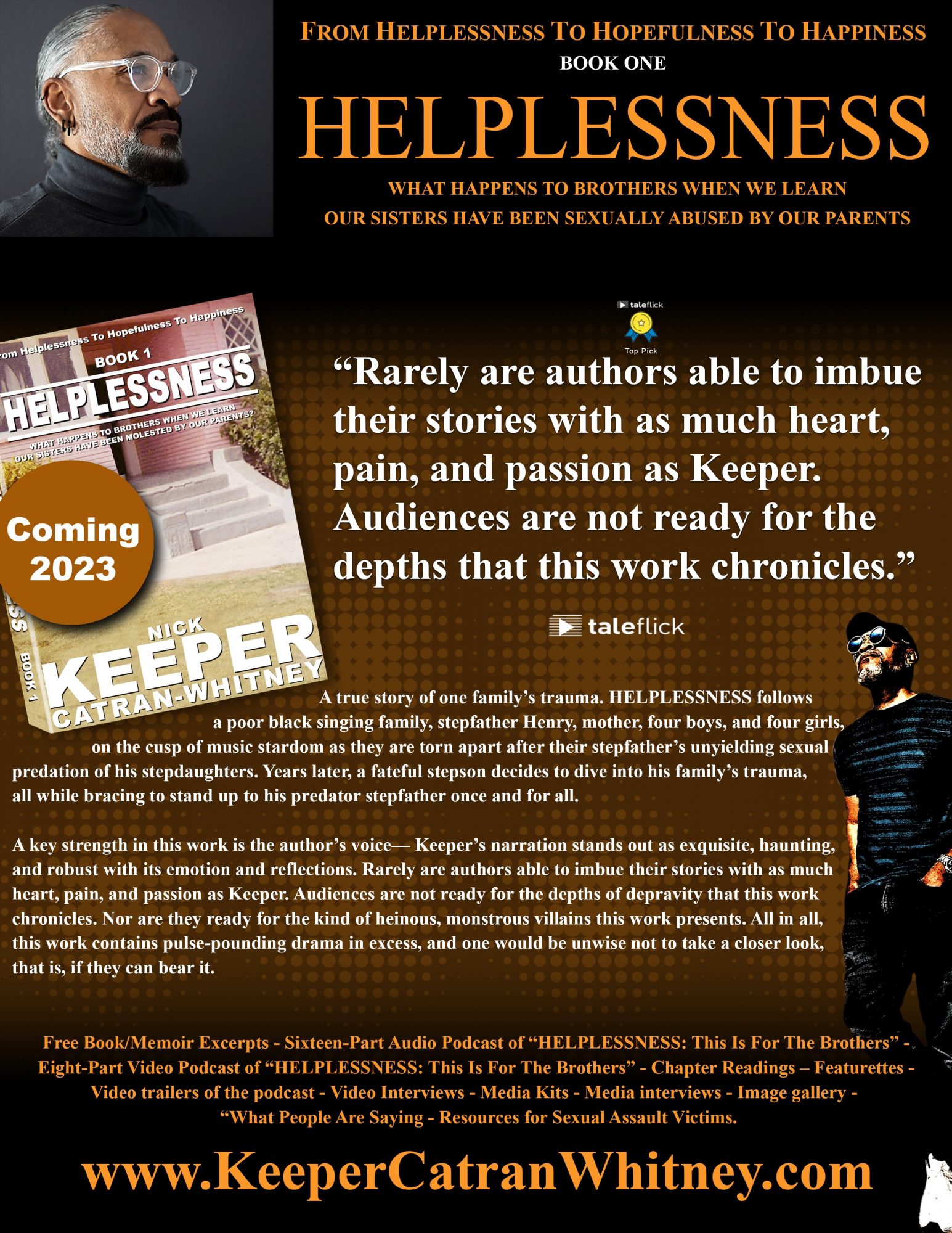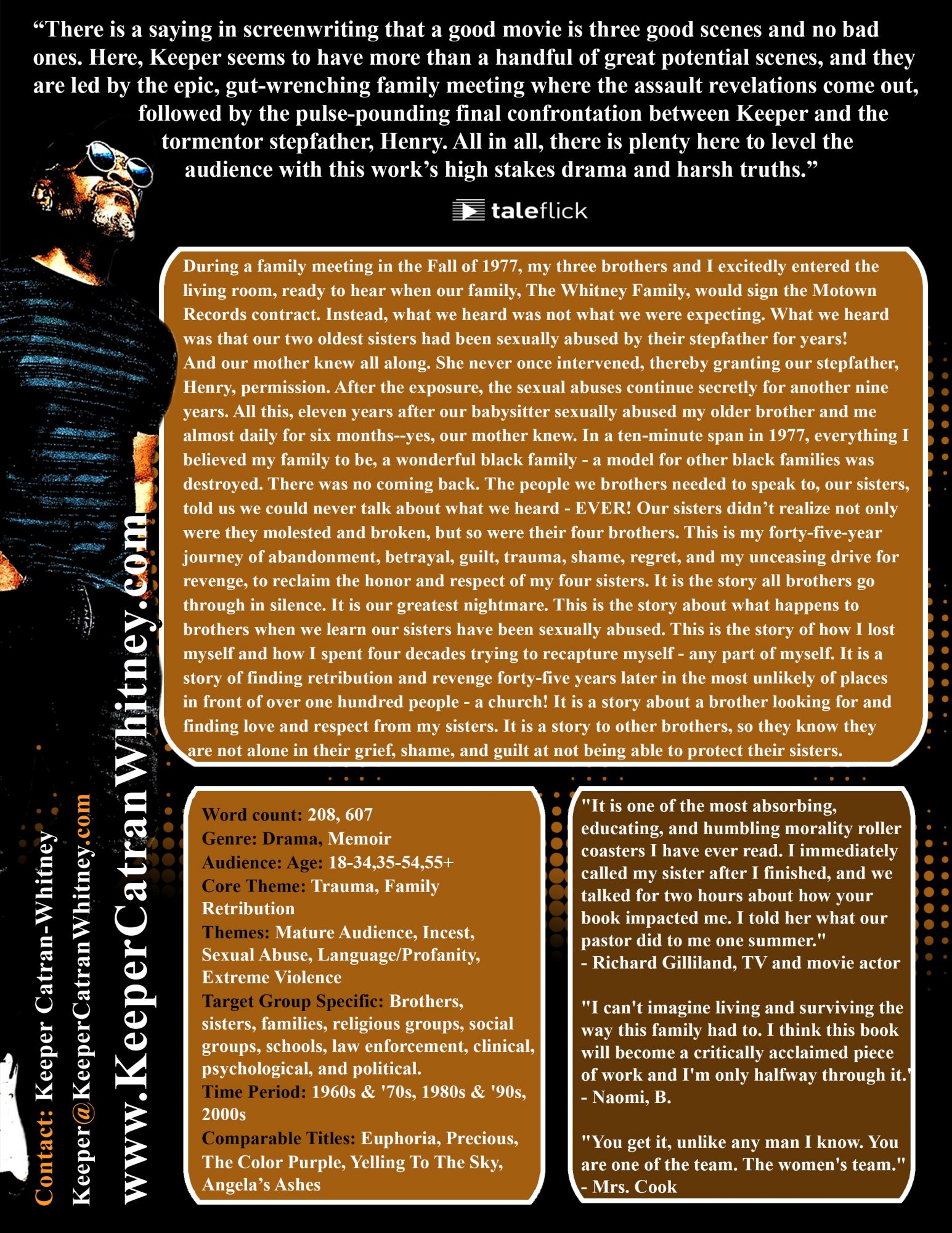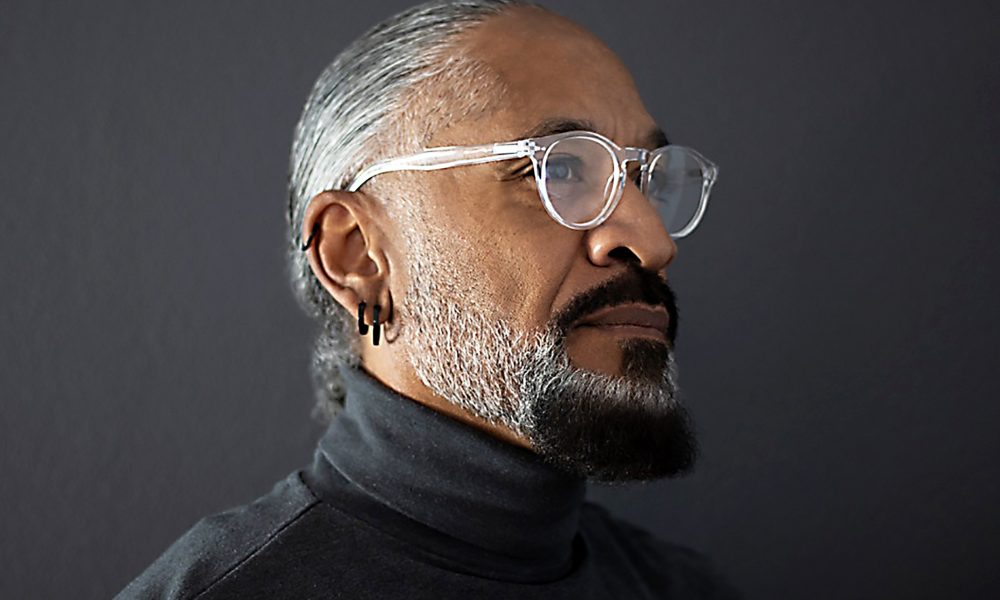

Today we’d like to introduce you to Keeper Catran-Whitney.
What can you tell us about your story?
In 1977, my family, The Whitney Family, made Billboard Magazine’s Top 100, both for an album and a single. After years of living in poverty and often being homeless, we finally found our way out when Motown Records called. Motown had been searching for their replacement for The Jackson Five for three years, which they had lost to EPIC Records. Days before signing our contract, my brothers and I learned a dark family secret. A secret kept in our home for years. A family meeting was called to discuss the signing date. It turned out that was not what the meeting was about. It was the meeting we four boys would learn our stepfather had been sexually abusing our sisters for years and that our mother knew but did nothing to stop it.
My family consisted of ten – my mother, stepfather, four girls, and four boys. My seven siblings and I are nine years apart. As sisters and brothers, we were very close. Shortly after the meeting started, it was clear four people didn’t know what it was indeed about – we four brothers. Over the next ten minutes, my family, which could withstand any threat from the outside, was ripped apart by those we trusted most – our stepfather and mother.
Unlike the others, my brothers and I had no warning of what was coming. So, discovering what had been happening to our sisters was devastating. My three brothers and I were knocked emotionally and mentally off balance. We didn’t know what to do, what to say, or how to react. My head was spinning. “Our family, how could this be? There is no way this is true. It can’t be. We boys would know about it. Mom would have stopped it! She would have put our stepfather out!”
The words, “Your stepfather has been sexually abusing your sisters, and I have known about it,” are words no brother can prepare for. Those words sap the soul out of brothers primarily because of the immediate guilt and shame that washes over us because we couldn’t protect our sisters.
Relationships between sisters and brothers, relationships that could never be broken, were broken in ten minutes. The wreckage of those relationships lay on the floor in shambles.
It took me forty-five years to find the courage to speak to my sisters about what happened. It took that long because my oldest sister said to her innocent brothers in 1977, “It didn’t happen to you boys. It only happened to us girls. It didn’t happen to you. You can’t talk about it – EVER!”. And like that, we brothers were locked out of the most important conversation of our life. Of course, my sister didn’t know how those words would impact her brothers. She needed to protect herself and her little sisters. I am in full support of her. My point is that the fallout is everywhere, impacting every aspect of family life and infecting every individual. No one in the family is immune to the pain and suffering.
After the sexual abuse of their sisters has been exposed, brothers suffer a particular form of mental and emotional PTSD that centers around shame and guilt at being unable to protect their sisters. Not only are we left out of the conversation, but our sisters often demand that we do not attempt to engage them in conversation. And yet, after the betrayal has been exposed, the brothers are isolated. We are the ones no one asks about. We are the ones whose pain is never noticed. We are the ones no one checks on, desperately needing to talk to someone, especially our sisters. The ones who contemplate suicide for failing our sisters. No one asks, “Are you okay? Do you need to talk?” However, we are the ones whose sisters asked, “How could you not know?” “How could you not suspect?” “How come you didn’t protect me, save me?” “How come you didn’t hear me weeping or see my tears?”
There are no support systems or tools to address the trauma the brother experience. We are expected to carry our trauma in silence as it eats away at us year after year.
It took me nine years to act after cowardly hiding behind my mother’s promise that she would take care of the situation. It took me nine years to act when I finally found the courage and told my stepfather, “You have 24 hours to leave our house. If you are still here by this time tomorrow, you will be dead because I will have killed you!” Luckily, he heeded my warning and left. Without support, the shame became so overwhelming that all I could do was lash out, almost killing my stepfather or, worse, him killing me. That would have led to even greater grief for my sisters. That put me on a forty-five-year journey to recapture my self-esteem and the respect and love of my sisters.
In the book, I share how I was able to bring closure for my sisters in a church in Van Nuys, California, in 2021 when I tracked my stepfather down. I waited for the service to end, and then I took over the church for ninety minutes. There was no way I was going to fail my sisters on that day. Delivering retribution for my sisters in the way I did was the most glorious ninety minutes of my life. More importantly, my sisters were proud of their brother for finally handling things.
Can you talk to us a bit about the challenges and lessons you’ve learned along the way?
I was shocked to learn I was the only person talking about the trauma brothers experienced in the child sexual abuse space. I am the lone voice pushing to create tools and support systems to help us with our pain.
No books have been written about the emotional struggle brothers endure after learning our sisters have been sexually abused by our parents. There are no articles in newspapers about our torment. There are no panel discussions about our pain, guilt, or shame. We are the ones without interviews in magazines or appearances on talk shows—the ones with no movies, mini-series, or documentaries about our nightmares. Without a moment to comprehend, understand, or process, we, brothers, are deemed more guilty than the molester or rapist if we do not immediately attack, strike, beat, or execute upon learning of the crime. We are the ones without family or friends with whom we can share our pain and guilt. We are the ones society leaves behind. After the betrayal, we are what is left over.
Brothers must be allowed to engage in the conversation. We must become allies with our sisters in the fight against child sexual abuse. Without this alliance, an invisible, unspoken wedge forever exists between sisters and brothers.
Brothers must be taught to recognize the signs of our sisters’ trauma, and we must be taught how to ask questions that support them if they are afraid to speak to us. By the same token, sisters must be able to recognize their brothers’ silence not as an act of uncaring but as our inability to approach them and our fear of speaking to them.
Brothers are the last taboo, the last inconvenient truth in the conversation about child sexual abuse. Why? Because we are taught at a very early age not to talk, not to show pain or hurt; otherwise, it is a show of weakness. Since men are the ones who establish these guidelines, they are the ones who make sure support is not in place lest our trauma is viewed as a mental health issue. It is a mental and emotional health issue and must be recognized and treated as such. Only then will brothers get the support they need.
For over 45 years, I have had a front-row seat to my own and four of my brothers’ (three full brothers and one half-brother) PTSD trauma. I have witnessed grown men who have carried the pain of being unable to protect their sisters break down and cry because of their burdens. And yet, many women I have spoken with about what my brothers, I, and other men are experiencing have told me without hesitation, “It didn’t happen to you. You can’t talk about it,” or “It happened to your sisters, so you have no say in the matter.” One told me, “Unlike us girls, you boys chose to carry this burden.” No brother would choose to carry such a burden.
What man chooses to go through life imagining what his sisters experienced, knowing he didn’t save them, and then being unable to talk about it? What brother decides to be locked out of one of the most critical conversations of his life? A conversation that determines, in many ways, his life’s emotional and mental trajectory. I have borne witness to the devastating emotional consequences of not having a conversation takes on brothers and families. My passion and my mission are to save as many brothers and sisters as I can from suffering what my siblings and I suffered. There is no doubt in my mind that having open, honest conversations would have changed the trajectory of our lives.
I refuse to believe my family’s almost twenty-year experience with child sexual abuse destined my sisters, brothers, and me to be tossed onto the dunghill of child sexual abuse left behind by time. Thousands of other families are in pain at this very moment, living in silence and without a chance to heal.
Yesterday a little girl or boy was sexually abused in the home. Today or tonight, more innocent children will be sexually abused. Tomorrow a girl or boy will go to school, come home happy, go outside and play, come in and have dinner and then kiss mom and dad good night. At some time in the night, their bedroom door will open, and the door will close. They will become the new victims of child sexual abuse. They will not be alone. There are more than 42 million survivors of child sexual abuse in America. (National Association of Adult Survivors of Child Abuse). Every nine minutes, child protective services substantiate or find evidence for a claim of child sexual abuse (RAINN).
In a spiritual sense, I believe my family was meant to experience what we did so that we may be able to help other brothers, sisters, and families heal by sharing our tragedy. Otherwise, what was the point if I couldn’t help families after what we went through?
Looking back, would you say it’s been easy or smooth in retrospect?
Nothing about my journey has been easy or smooth. I had many dark days filled with tears and tremendous shame. Because I remained silent, it has always been a struggle to reclaim my self-esteem and self-worth. It wasn’t until I pushed through my fear of being rejected by my sisters that I could call them and talk about what happened. Two things drove me more than anything. One, I had to complete the mission of bringing down my stepfather for my four sisters, no matter how long it took. I tracked him down in January 2021 at a church in Van Nuys, California. He had his day of reckoning. In my upcoming book, HELPLESSNESS: The Trauma Brothers Experience Once We Learn Our Sisters Have Been Sexually Abused By Our Parents. (Summer 2023), I go into dramatic detail about how it happened. It was spectacular. I had my Celie from the movie, The Color Purple moment. And two, I wanted the love and respect of my sisters. I craved it. I had to have it to feel worthy of being called their brother.
Appreciate you sharing that. What else should we know about what you do?
Not only have I written the only book on the trauma brothers experience after learning of their sister’s sexual abuse, but I also speak on the topic. I share my healing and empowering strategies that helped me, my brothers, and my sisters. I am the lone voice on the subject. My mission is to elevate the trauma brother’s experience so that we have a say in the conversation and support systems can be created. I describe brothers as ‘the last taboo or the inconvenient truth in discussing child sexual abuse.’ We need a voice, so I’ve decided to be that voice.
After nine emotional rollercoaster years of writing HELPLESSNESS, I share my story in all its ugly, vivid detail to show just how far down the rabbit hole the trauma leads for brothers’. I am incredibly proud that three of my sisters and two brothers contribute sections to the book providing the first-ever full family view of child sexual abuse in the home. I am pleased that my five siblings would trust me with their trauma. That two of my brothers would be vulnerable enough to share their guilt, shame, and betrayal with me so that we three brothers could help other brothers. But most of all, I am humbled by my sisters that they would trust me with their secrets and their pain and allow me to share them so the world can see how deep inside the trauma that impacts sisters and brothers.
I am also incredibly proud of my podcast, “This Is For The Brothers” (KeeperCatranWhitney.com). It is a 16-part audio and video series with my sisters and brothers that takes a deep dive into the trauma brothers experience. It features three powerful conversations with family members, including a one-on-one with my son as he challenges me to explain my role and failure. Another is with my son, my older brother, and myself. It was the first time my brother and I confronted our failings around our sister’s abuse and the trauma we brothers carry because we did not talk about it. The last four episodes feature my older brother, one of my sisters, and myself. For the first time, this four-part episode documents a conversation between sisters and brothers about the sexual abuse in our family. It was emotionally challenging talking to my sister, and having to admit all the should of, could of, and would of that I didn’t do. It was very candid, intense, and loving.
The three of us take a deep dive into what happened. I mean, we go way down the rabbit hole. Our willingness to be vulnerable with each other allowed the conversation to explore hurt feelings, misconceptions, and misunderstandings between sisters and brothers. We get into our feelings of anger, mistrust, guilt, shame, and betrayal. It shows us reconnecting in love and trust, proving that creating space for discussion is the only path forward for sisters and brothers, no matter how hard and terrified we might be. I have begun writing book two, HOPEFULNESS.
I am looking forward to writing book three, HAPPINESS.
Can you talk to us a bit about happiness and what makes you happy?
Without question, what makes me happy is having my sisters in my life. They are my heroes. For them to experience the amount of sexual abuse they experienced for as long as they did and emerge the people they are is spectacular. They are all funny, brilliant, and compassionate people. That they would give a brother like me a chance for redemption after forty-five years speaks to the type of people they are.
Of course, my family of five. We are a group of different races, religions, lifestyles, and sexualities. We truly represent the emerging world. What also makes me happy is sharing my family’s story with other sisters in the hope that they understand their brother’s pain and with brother’s so they know they are not alone in their trauma.
Pricing:
- The book comes out in the summer of 2023. The publisher has yet to set a price for the book.
- An advanced PDF copy of HELPLESSNESS is available to the media upon request.
- I am available for speaking engagements, television appearances, and interviews regarding HELPLESSNESS and the devastating effects of sexual molestation on families—especially on brothers whose sisters have been molested. Contact my publicist, Flo Jenkins. Her contact information is below.
Contact Info:
- Website: www.KeeperCatranWhitney.com
- Email: [email protected]
- Facebook: KeeperCatranWhitney
- Other: Phone: 818-857-8841
